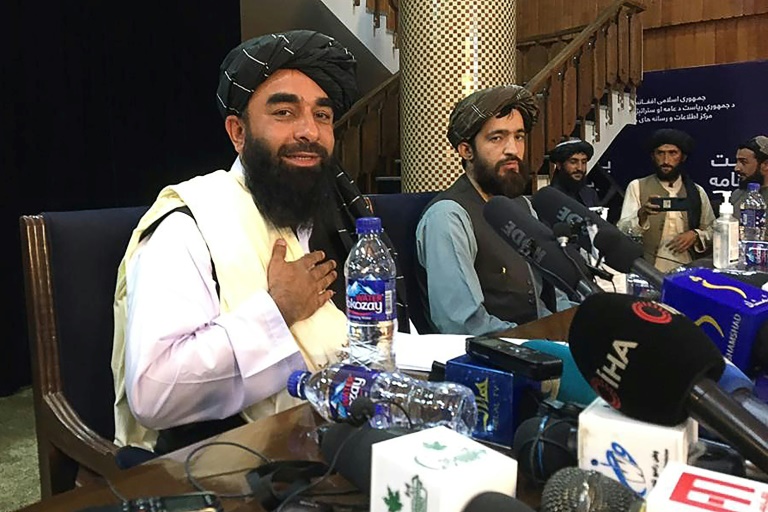Former Afghan president Ashraf Ghani who fled the country as it toppled to the Taliban was on Wednesday seeking refuge in the United Arab Emirates, as the hardline group pledged a different rule from two decades ago.
Ghani flew out of the country on Sunday as the militants closed in on the capital Kabul, sealing the Taliban’s rapid victory and a return to rule two decades after they were ousted by a US-led invasion.
On Wednesday, the United Arab Emirates said it was hosting Ghani and his family “on humanitarian grounds”, in the first confirmation of his whereabouts.
The Taliban have offered a pledge of reconciliation, vowing no revenge against opponents and to respect women’s rights — but there are huge concerns globally about the Taliban’s brutal human rights record and tens of thousands of Afghans are still trying to flee.
“All those in the opposite side are pardoned from A to Z,” Taliban spokesman Zabihullah Mujahid told foreign and local reporters, in the movement’s first press conference.
“We will not seek revenge.”
While the leadership tried to project a new image, video footage shot by Pajhwok Afghan News, a local news agency, showed protesters in the city who were carrying the Afghan flag fleeing with the sound of gunshots in the background.
“While I was filming, a Taliban (militant) started hitting me with a gun from behind,” said Babrak Amirzada, a journalist for the agency said.
Mujahid said the new regime would be “positively different” from their 1996-2001 stint, which was infamous for deaths by stoning, girls being banned from school and women from working in contact with men.
“If the question is based on ideology, and beliefs, there is no difference… but if we calculate it based on experience, maturity, and insight, no doubt there are many differences,” Mujahid told reporters.
He also said they were “committed to letting women work in accordance with the principles of Islam”, without offering specifics.
A spokesman for the group in Doha, Suhail Shaheen, told Britain’s Sky News that women would not be required to wear the all-covering burqa, but he did not say what attire would be acceptable.
– Statue decapitated –
As the Taliban boasted of being a changed movement, residents in Bamiyan city reported that a statue of Hazara leader Abdul Ali Mazari, killed by the group in the 1990s, had been decapitated.
Hazaras have long been persecuted for their largely Shiite faith and were massacred in the thousands during the Taliban’s ruthless conquest of the country in the 1990s.
“We are not sure who has blown up the statue, but there are different groups of Taliban present here, including some… who are known for their brutality,” a resident told AFP, asking not to be named.
The Taliban astonished the world in 2001 when it destroyed two monumental and ancient Buddha statues in Bamiyan, after deeming them un-Islamic.
In the eastern city of Jalalabad, the Taliban fired shots as residents protested over the removal of Afghan flags that were replaced with those of the hardline movement, according to local media.
– Desperation –
Afghans and foreigners continued to flee the country, with the United States and other nations stepping up evacuation airlifts from Kabul.
Desperate scenes from the airport at the start of the week have created searing images of Afghans terrified of the Taliban, and a diminished United States unable to protect them.
Some footage showed hundreds of people running alongside a US Air Force plane as it rolled down the runway, with some clinging to the side of it.
One person was later found dead in the wheel well of the plane.
Crowds also built outside embassies in Kabul on Wednesday on rumours that governments were offering asylum.
In a dramatic culmination to the Taliban’s takeover, Mullah Abdul Ghani Baradar, the movement’s co-founder and deputy leader, returned to Afghanistan from Qatar on Tuesday night.
He chose to touch down in the country’s second biggest city Kandahar — the Taliban’s spiritual birthplace and capital during their first time in power.
– Human rights concerns –
The United Nations Human Rights Council announced on Tuesday it would hold a special session on Afghanistan next week to address the “serious human rights concerns” under the Taliban.
US President Joe Biden’s administration gave a non-committal response to the Taliban’s pledges of tolerance.
“If the Taliban says they are going to respect the rights of their citizens, we will be looking for them to uphold that statement and make good on that statement,” State Department spokesman Ned Price said.
The European Union, United States and 18 other countries issued a joint statement on Wednesday saying they were “deeply worried about Afghan women and girls”, urging the Taliban to ensure their safety.
Meanwhile Russia and China have signalled their willingness to work with the Taliban.










